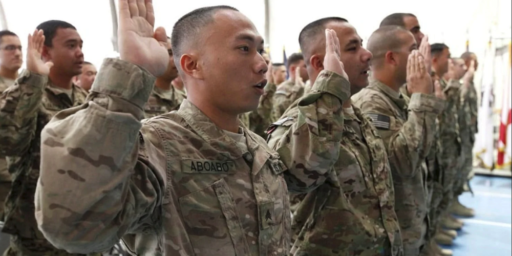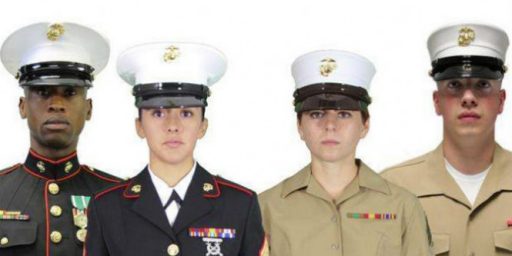Military Recruiters Target Friends and Family
The Army and Marine Corps, both having a hard time recruiting in the midst of a ground war, are focusing their recruiting efforts on the parents and friends of prospective enlistees.
Army, Marine recruiters shift focus to wary parents (USA Today, p1.)
Faced with wilting recruitment and ongoing violence in Iraq, Army and Marine Corps recruiters are turning their attention to those most likely to oppose them: parents. The two branches are shifting from a strategy that focused first on wooing potential recruits to one aimed at gaining the trust and attention of their parents by using grass-roots initiatives and multimillion-dollar advertising campaigns. The public relations push comes as the Army and Marines, which absorb the brunt of the casualties in Iraq, encounter one of their worst periods in recruitment.
Among their initiatives:
*Four new ‘influencer’ TV ads by the Army, aimed at moms, dads, coaches and ministers. The ads air this month.
*A decision to pair Army recruiters with Iraq and Afghanistan veterans on visits to the homes of potential recruits. The idea: Tell parents ‘the Army story,’ says Army spokeswoman Lt. Col. Pamela Hart.
*A nine-minute video, ‘Parents Speak’ in which parents of Marines say the Corps has been good for their children.
*A direct-mail campaign by the Marines to parents of high school juniors and seniors. The Marines highlight the benefits of joining and ask for an opportunity to talk to the students’ parents about a military career.
Studies for the Army show parents are the top obstacles to recruiting. ‘Opposition to ‘ military service is increasing significantly among both moms and dads,’ says a study of 1,200 potential recruits by the firm Millward Brown.
They’re Talking Up Arms (LAT, p. 1)
As the conflict in Iraq entered its third year, the Marines missed their monthly recruiting goals in January through March for the first time in a decade, and the Army and the National Guard also fell short of their needs. This year, the Army and the Marines plan not only to increase the number of recruiters, but also to penetrate high schools more deeply, especially those least likely to send graduates to college. For [Marine Sgt. Rick] Carloss and other recruiters, part of the way has been cleared by the No Child Left Behind education law of 2002, which provides the military with students’ home addresses and telephone numbers. It also guarantees that any school that allows college or job recruiters on campus must make the same provision for the military.
Once in the door, lining up enlistees means becoming part of the school culture. Carloss spent seven weeks in recruiting classes to hone his marketing and communication skills. His techniques are similar to those in the Army’s “School Recruiting Program Handbook,” published last year. The guide instructs recruiters to deliver doughnuts and coffee for the school staff once a month; attend faculty and parent meetings; chaperon dances; participate in Black History Month and Hispanic Heritage Month events; meet with the student government, newspaper editors and athletes; and lead the football team in calisthenics. It lays out a month-by-month plan to make recruiters “indispensable” on campus. The booklet states: “Be so helpful and so much a part of the school scene that you are in constant demand.” It advises recruiters to get to know young leaders because “some influential students such as the student president or the captain of the football team may not enlist; however, they can and will provide you with referrals who will enlist.”
These initiatives make a lot of sense. One suspects that the use of No Child Left Behind databases for this purpose will draw some protests, however.



